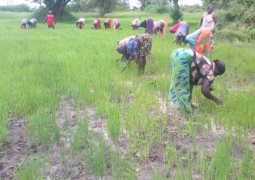….to sustains biodiversity, address climate change and secure livelihoods
Hello and a warm welcome to yet another edition of the environment, your weekly column that bring environmental issues to the lime light.
In our today’s edition, we look at the possibilities of sustaining biodiversity to address climate change and secure food security through investing in protected areas in the West African sub-region.
Coastal and marine species and habitats have faced increasing pressure in
In order to address these challenges, considerable efforts have been made by various players e.g. governments, local communities, NGOs and development partners among others; to build a representative network of Protected Areas in West Africa.
However, in order speed up the implementation of the Convention on Biological Diversity (CBD) Programme of Work on Protected Areas (PoWPA) and enable countries to meet their obligations, there is a need to develop sustainable financing mechanisms for protected areas both at national and regional level.
Individual countries like The Gambia have been implementing biodiversity conservation strategies and conservation action plans for specified species. However considering the transboundary nature of many habitats and migratory patterns of certain species, seven West African countries (Cape Verde, Guinea, Guinea Bissau, Gambia, Mauritania, Senegal and Sierra Leone) have decided to join their efforts to adequately address common issues related to the conservation of coastal and marine resources.
Besides efforts from individual states, different partners from the seven countries are engaged in implementing the Regional Program for Coastal and Marine Conservation (PRCM) with the technical support of international conservation organizations (IUCN, FIBA, WWF, Wetlands International and the International Financial Partners).
As called for in the CBD Program of Work on Protected Areas, an ecological gap assessment is being carried out at the regional Marine Protected Area systems level, and management effectiveness assessments have been carried out at national and regional levels. In addition, based on the ongoing PoWPA review of implementation, financial needs assessments at national and regional level are also planned.
Important results have been achieved in mobilizing the political government and formal support of states to the different regional conservation initiatives and significant progress has been made so far in terms of raising increased awareness on the conservation needs of the most threatened species and habitat and on the necessity of reinforced cooperation and of a harmonized approach at the sub-regional scale, in order to achieve the CBD targets in this part of the world.
Considerable efforts are being invested in order to put the CBD program of work on Protected Areas into practice, such as the regional strategy for Marine Protected Areas (MPAs), which led to the establishment of a regional network of MPAs in 2007. However, one of the main challenges remains the need to further strengthen sustainable funding for Protected Areas.
The seven countries have agreed to organize a regional roundtable on protected area financing, consistent with decision Vlll/24, paragraph 18a of the 8th COP to the CBD, as well as recommendation of SBSTTA 14th to the COP 10th, in cooperation with the CBD secretariat’s Life Web Initiative.
This round table among governments and international cooperation partners have been announced at the COP 10th meeting, held on May 27th , 2011, in Dakar Senegal, with the goal of strengthening and fostering coordination for financing of protected areas solution in the region.
GOALS
In accordance with national and regional priorities as well as current and post COP targets of the CBD, the main objectives of the round table are:
- Strengthen and raise awareness about national and regional priorities on the creation and effective management of Protected Areas in relation to the 2010-2020 CBD targets.
- Identify and agree on national and regional priorities for sustainable financing for Protected Areas.
- Catalyze the engagement of donors in protected area management for
EXPECTED RESULTS
The round table will showcase the important achievements in biodiversity conservation in the member countries of PRCM region, to catalyze ambitious commitment to achieve the CBD targets and mobilize sustainable financing for protected area management to address the most urgent challenges.
The priorities which will be conveyed by the governments of the region to the international donor community during this roundtable will be based directly on identified ecological, management and financial priorities, as called for the CBD program of work on protected areas.
For any suggestions, contributions and contact (00220) 6361340 or 7142236; Email: asallah6@yahoo.com




